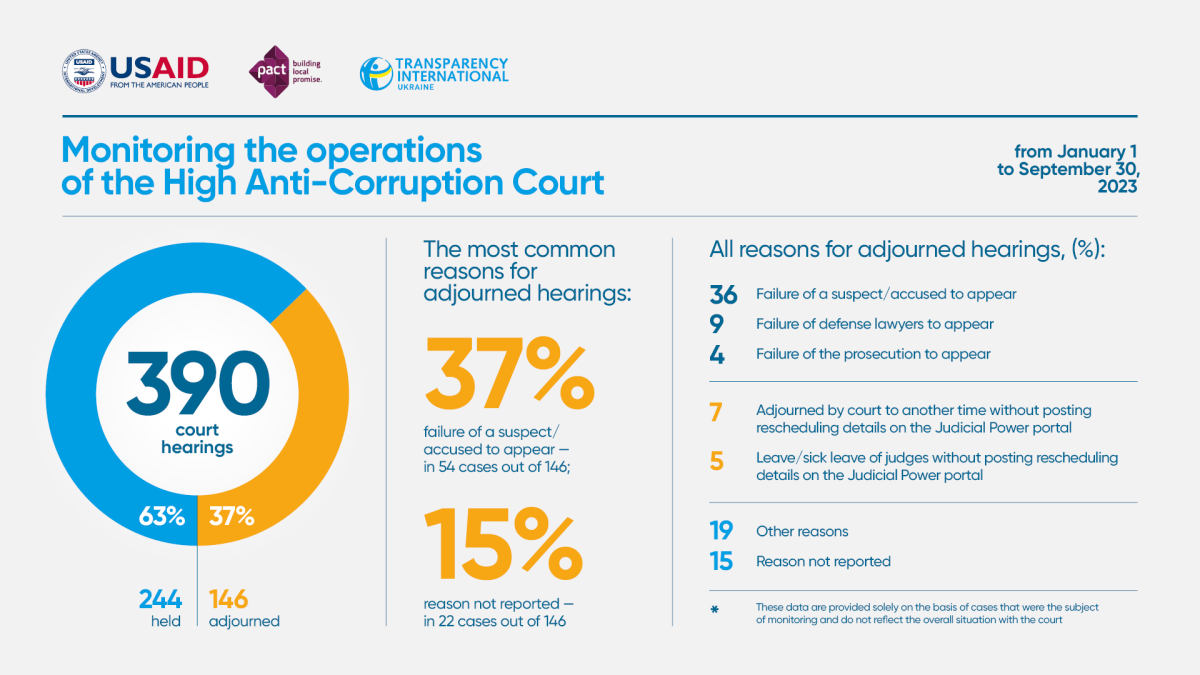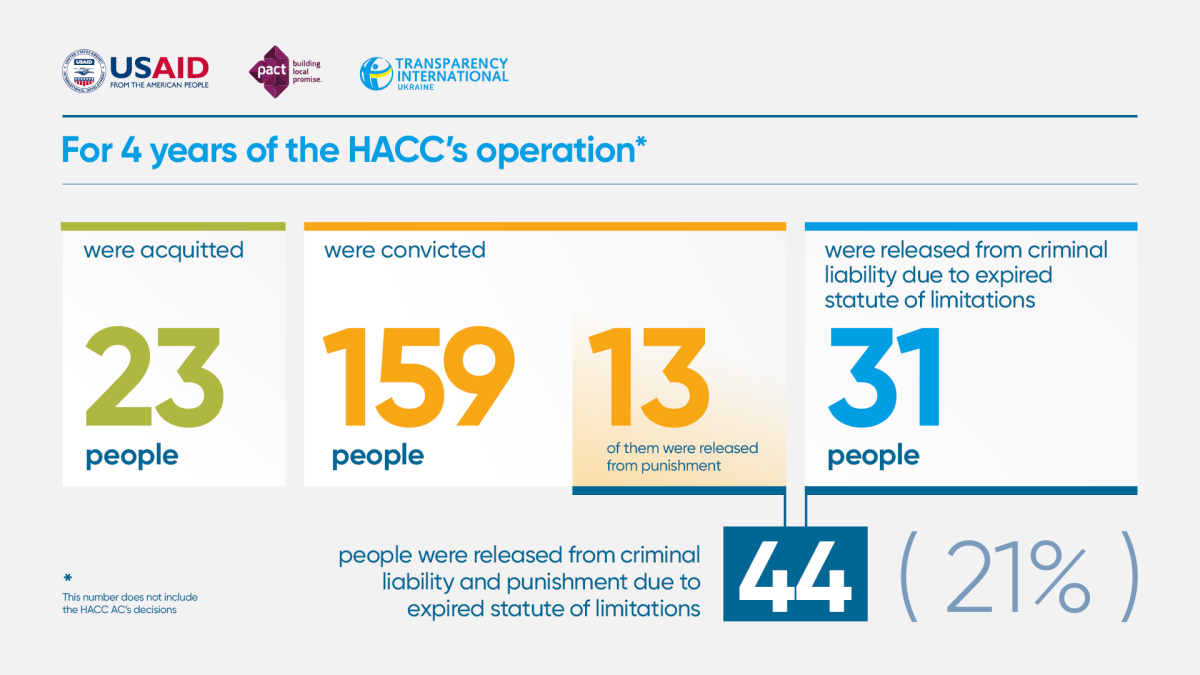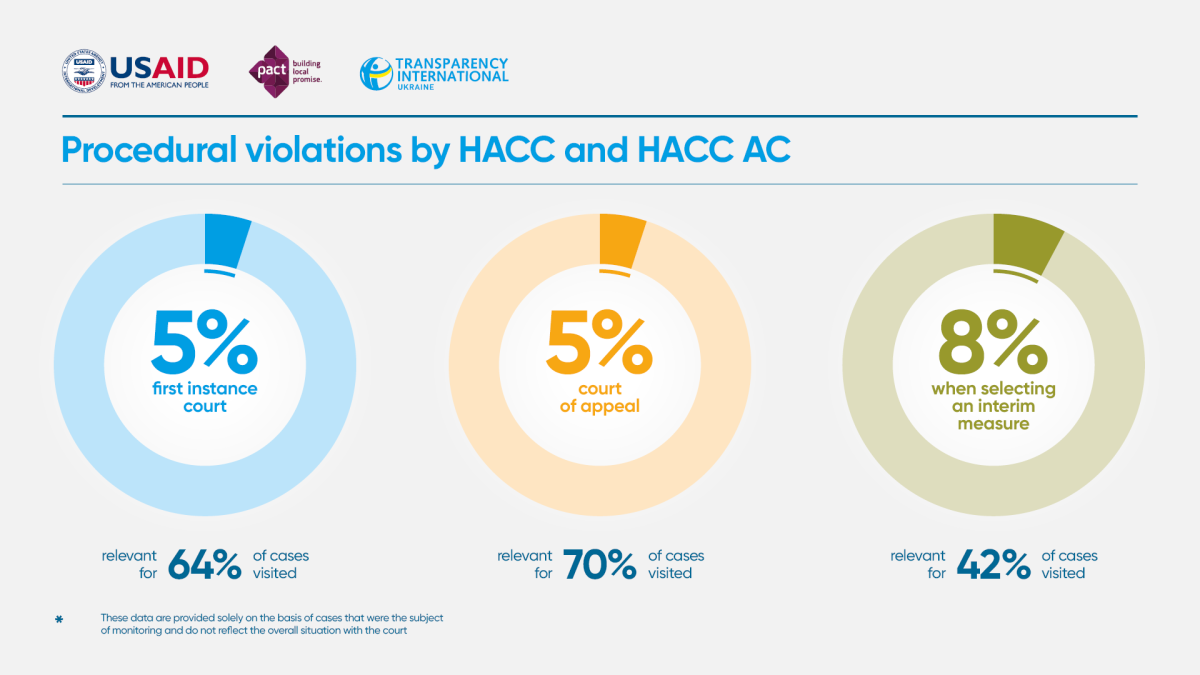

Transparency International Ukraine continues to monitor the work of the High Anti-Corruption Court. Our team experts attended court sessions, analyzed the institutional and operational aspects of HACC’s operations, and studied its decisions.
Consistently studying HACC’s activities thoroughly enables us to pinpoint both specific trends that serve as best practices in managing HACC’s work and any arising issues.
This report presents the results of the fourth stage of the HACC monitoring. Let us remind you that the first stage of the HACC operations monitoring covered the period from July 6 to December 6, 20202; the second stage was from April 1, 2021 to July 31, 2021, and the third one covered April 1, 2021 to February 23, 2022.
In this report, we paid more attention to the previously identified and past-year problems of the HACC. That’s the reason we’ve delved into greater detail on the following questions:
- suspension of trial because of mobilization of an accused,
- introduction of a single judge trial, and
- prevention of abuse of procedural rights.
Moreover, over the past year of HACC’s operation, the issues concerning the validity of suspicion during interim measures and the expiration of the statute of limitations have become even more pertinent. Consequently, we’ve allocated two separate sections in our report to address these matters.
The results of this HACC monitoring showed that the court’s procedural efficiency has not changed. But there are specific problems that need to be solved. Please see below the list of problems and the ways to solve them.
The results of this HACC monitoring showed that the court's procedural efficiency has not changed. But there are specific problems that need to be solved. Please see below the list of problems and the ways to solve them.
1. The number of adjourned court sessions remains high, and HACC judges hardly use their options to bring to administrative responsibility for contempt of court.
Therefore, the Parliament needs to improve the existing procedural levers of influence on participants in criminal proceedings for failure to appear without valid reasons. More specific, the court shall be authorized to impose monetary penalties on lawyers. Judges, in turn, should respond to inappropriate participants’ behavior and hold them accountable for contempt of court.
2. Various approaches to suspending court proceedings due to the mobilization of the accused impact the adherence to reasonable trial deadlines.
Therefore, judges should ensure consistency of this practice. For example, they need to consider if a mobilized accused may really participate in the trial. Also, the speed of consideration of criminal proceedings can be positively affected if the Parliament introduces a single-judge trial.
3. Some participants in the HACC trials sometimes abuse their procedural rights.
Existing preventive tools are not always effective. Therefore, the Parliament should formalize the institution of countering abuse of procedural rights in the Criminal Procedure Code of Ukraine.
4. Monitoring showed certain problems with the assessment of public interest when approving plea agreements. The court also lacks the authority to evaluate the evidence used by prosecutors to justify someone’s guilt.
This can negatively affect the public perception of the institution.
Therefore, when approving plea agreements, the HACC shall make criteria for assessing public interest, so that the final sentence (or release from serving it) meets both the public request and the interests of accused.
The Parliament also needs to enhance the powers of judges in assessing the legality of such agreements and authorize them to examine the evidence that forms the basis of the indictment.
5. The HACC should stop classifying the entire text of sentences.
There’s a need to establish technical capabilities to conceal specific sections of court decisions from public access, particularly content that could potentially harm ongoing criminal proceedings if disclosed.
6. The HACC practice still does not have developed consistent criteria for assessing the validity of suspicion when applying interim measures.
This may negatively affect the effectiveness of judicial control.
Therefore, the court should regulate this at the level of generalization of its own practice. In achieving this, it’s essential to remember that determinations regarding reasonable suspicion are formed based on the principles of inductive reasoning. That is the more evidence provided by the prosecution that someone committed a certain act, the more convincing the statement, and the more reasonable the suspicion. If and investigating judge is provided with information that refutes the key theses of the prosecution, or the information provided by that party is inconsistent and contradictory, this may indicate that the suspicion is unfounded.
It’s crucial to highlight that in situations where specific components of the criminal offense cannot be incriminated to an individual, and their attainment in the future is unfeasible, investigating judges may determine the lack of reasonable suspicion.
7. During the last period of the HACC monitoring, the number of cases when criminal proceedings were closed due to the expiration of pre-trial investigation periods (Lozovyi’s amendments) has increased.
This is due to the not entirely predictable decision of the Joint Chamber of the Supreme Court of October 31, 2022.
Therefore, cassation courts should predictably and carefully solve the problem of the subject of extension of time limits in criminal proceedings initiated both before and after March 16, 2018. The Parliament also needs to remove the mandatory obligation of the court to close criminal proceedings due to the expiration of the pre-trial investigation period.
Judges must proceed from the date of entering information about criminal proceedings in the Unified Register of Pre-Trial Investigations and decide whether to apply the “Lozovyi’s amendments”. But in that case, there may be abuse by pre-trial investigation bodies manifesting in artificially combining “old” criminal proceedings with “new” ones. That can be done so that the terms of pre-trial investigation in proceedings with suspects are continued not by the investigating judge, but by the head of the prosecutor’s office.
In such cases, we recommend analyzing whether the pre-trial investigation was conducted based on the same facts. That will make clear whether there’s really the same case involved, or some cases were joined artificially.
The following matters should be resolved about amendments to the Criminal Procedure Code of Ukraine in part of duration of pre-trial investigation:
- An investigating judge should not extend the terms of a pre-trial investigation when there are no suspects in criminal proceedings. Individuals whose rights are limited without being notified of suspicion should have the option to contest the length of the pre-trial investigation.
- Simultaneously, in cases involving suspects, pre-trial investigation periods should be extended by an investigating judge. If such timelines are extended by the head of the prosecution body, their decision should be subject to appeal in court.
- The expiration of the pre-trial investigation period should not necessarily lead to the closure of criminal proceedings. Therefore, the provisions of Article 284, part 1, clause 10 of the Criminal Procedure Code of Ukraine should be canceled.
8. The expiration of the statute of limitations for bringing to criminal responsibility has already become a problem, which may later become even greater.
Therefore, the Parliament should:
- expand the grounds for suspending the statute of limitations,
- proportionally strengthen criminal liability for certain criminal offenses (this will automatically affect the increase in the statute of limitations for bringing persons to criminal responsibility),
- change the moment when the calculation of the statute of limitations exprires; not the entry into force of the verdict but its issue by the first instance court.
Thus, the four-year period of HACC operation is significant enough to claim that the level of process and procedural violations is low.
Transparency International Ukraine is convinced that approaches to the HACC’s work should be further improved in order to ensure effective judicial control and administration of justice.
Read the full version of the report to learn more about the monitoring results.
This report was developed by Transparency International Ukraine as part of its project implemented under the USAID/ENGAGE activity, which is funded by the United States Agency for International Development (USAID) and implemented by Pact. The content of this report is the sole responsibility of Pact and its partners and does not necessarily reflect the views of USAID or the U.S. Government.









